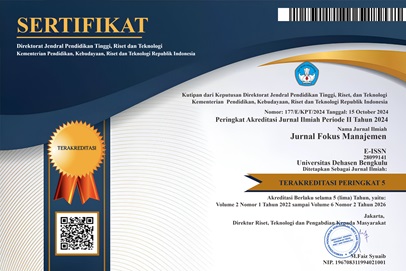An Analysis Of The Accounting For Employee Income Supplement (TPP) Budget Responsibility At Disdikbud
Abstract
The accountability report must be able to trace the inefficiencies of each component, so that corrective actions can be taken if a situation is found that may cause the established goals to not be achieved. The purpose of this research is to analyze the accounting for the responsibility of the Additional Income Budget of Employees (TPP) at DISDIKBUD Seluma Regency. Data collection was conducted through interviews, and the analysis method used in this study is descriptive method. The results of the study show that the organizational structure at the Department of Education and Culture of Seluma regency for the implementation of the TPP budget is considered good due to the separation of responsibilities. The TPP budgeting is carried out by the budget planning department, while the disbursement of TPP is executed by the finance department. The budget preparation at the department is based on the Decree of the Regent of Seluma Regency, and the budget disbursement is done by proposing the TPP amount from each employee to the treasurer. The treasurer then compiles a summary for all employees' TPP, which is then reviewed by the PPK before being submitted to the Head of Department for approval. Once approved, the TPP can be disbursed. The Department of Education and Culture of Seluma regency has not adequately separated controllable and uncontrollable costs, as the TPP expenses are included in controllable costs. The department has prepared accountability reports in the form of TPP budget realization reports. In the accountability report, it can be seen the comparison between the budget and its realization, as well as the differences. For the year 2022, the budget realization was 93.62%, and for 2023, it was 89.83%. This budget surplus occurred due to deductions in TPP for employees who committed violations such as arriving late, not clocking in, and performance not meeting working hours
Downloads
Copyright (c) 2024 Dendi Sanjaya, Neri Susanti, Yudi Irawan Abi

This work is licensed under a Creative Commons Attribution-ShareAlike 4.0 International License.
An author who publishes in the Jurnal Fokus Manajemen (JFM) agrees to the following terms:
Author retains the copyright and grants the journal the right of first publication of the work simultaneously licensed under the Creative Commons Attribution-ShareAlike 4.0 License that allows others to share the work with an acknowledgement of the work's authorship and initial publication in this journal
Submission of a manuscript implies that the submitted work has not been published before (except as part of a thesis or report, or abstract); that it is not under consideration for publication elsewhere; that its publication has been approved by all co-authors. If and when the manuscript is accepted for publication, the author(s) still hold the copyright and retain publishing rights without restrictions. For the new invention, authors are suggested to manage its patent before published. The license type is CC-BY-SA 4.0.
Jurnal Fokus Manajemen (JFM) is licensed under a Creative Commons Attribution-ShareAlike 4.0 International License.
You are free to:
Share — copy and redistribute the material in any medium or format
Adapt — remix, transform, and build upon the material
for any purpose, even commercially.
The licensor cannot revoke these freedoms as long as you follow the license terms.






